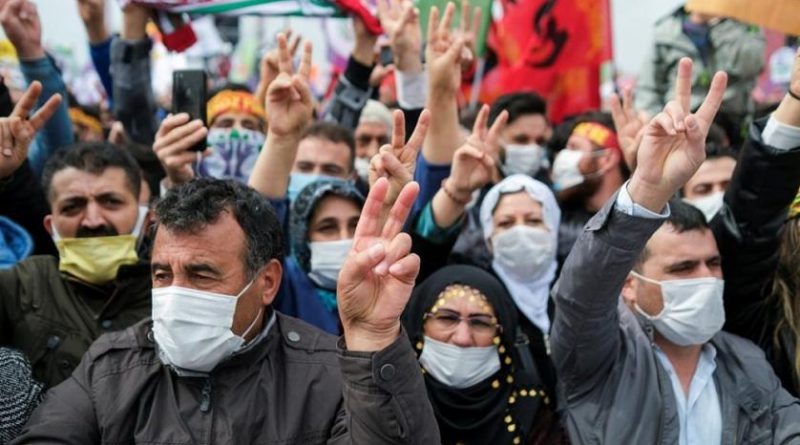Supporters voice defiance after bid to ban pro-Kurdish party in Turkey
Istanbul (Reuters) – Turkish Kurds voiced anger on Saturday over a court attempt to ban a pro-Kurdish political party, turning their Newroz spring festival celebrations across the country into a show of defiance.
In the culmination of a years-long crackdown, a prosecutor filed a case this week to close the Peoples’ Democratic Party (HDP) over alleged links to Kurdish militants. The HDP, parliament’s third-largest party, denies such ties and called the move a “political coup”.
“They know closing the HDP will not be a solution. You can close a party but you can’t close people’s minds,” Abbas Mendi, 45, said at a Newroz celebration in Istanbul, where thousands gathered at a rally amid tight police security.
The crowd waved the brightly coloured flags of the HDP and other left-wing parties, played Kurdish music and danced after listening to speeches by HDP officials. It won 11.7% support, or nearly 6 million votes, in a 2018 general election.
“They closed 7-8 parties like this before and they came back stronger,” said Mendi, a 45-year-old man from Sirnak in Turkey’s mainly Kurdish southeast, describing Newroz as a “festival of peace, resistance and resurrection”.
Celebrating Newroz, the Persian New Year, has long been a mark of pride for Kurds, who make up some 20% of Turkey’s 84 million people and live mainly in the southeast. Istanbul also has a large Kurdish population.
Ridvan Aktas, 30, said he thought no ethnic group in the world had suffered as much oppression as the Kurds, and accused President Tayyip Erdogan’s government of targeting anyone who opposed it. The government says it treats all citizens equally.
“If you are near to them you are good, but if you stand apart from them you are a terrorist, a traitor. The HDP is our honour and our guide. There is no way they can close it,” said Aktas, who works in the fishing industry.
Turkey has a long history of shutting down political parties that it regards as a threat and has in the past banned a series of pro-Kurdish parties.
Erdogan’s government, like the prosecutor, accuses the HDP of close ties to Kurdistan Workers Party (PKK) militants, which is designated a terrorist group by Turkey, the United States and European Union. The HDP has repeatedly denied any such links.
The PKK launched an insurgency against the state in 1984 and more than 40,000 people have been killed in the fighting. Some Kurds say the current situation is reminiscent of the height of the conflict in the 1990s.
“We are experiencing how it was in the 90s now. It is getting increasingly worse. They force our deputies out of parliament. They think they have the right, but we are seeking our rights,” said Semsiyan Aslanhan, a 43-year-old woman.
The prosecutor’s case to close down the HDP kicked off a tumultuous week in Turkey. Early on Saturday, Erdogan pulled the country from an international accord designed to protect women, and sacked the central bank governor.


